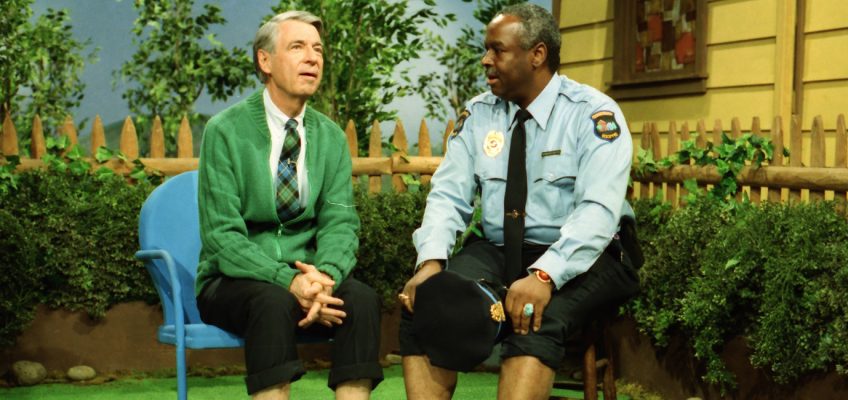Fred Rogers was ahead of his time. Fifty years ago, in one of the first episodes of Mr. Rogers Neighborhood, King Friday the 13th built a wall and prepared to go to war in order to “keep out the changers.” At the time, the Vietnam War was causing deep divisions in the country. In the Neighborhood of Make-Believe, the king eventually decides to opt for peace and removes the wall after his neighbors use balloons to float messages of kindness over the barricade.
Those balloons are among the many memorable images in a new documentary Won’t you Be My Neighbor, produced by award-winning director Morgan Neville. The idea for the documentary emerged from a conversation Neville had with Yo-Yo Ma when the two of them were working on “The Music of Strangers: Yo Yo Ma and the Silk Road Ensemble.” When Neville asked Ma how he figured out how to be a famous person, Ma replied “Mister Rogers taught me.” Neville laughed, but Ma was serious. He said he was a regular on the show and Rogers saw that he was struggling with his role as a public figure. Ma remembers that Fred Rogers went out of his way to mentor him and help him use his celebrity as a force for positive change.
Practicing “Radical Kindness”
Neville started watching YouTube videos of commencement speeches given by Fred Rogers and eventually gained access to a vast archive of materials about the television program. Instead of producing a standard bio-pic, Neville delves into the ideas and principles at the heart of Mr. Roger’s Neighborhood. “Fred Rogers wouldn’t have called it this but he practiced a kind of radical kindness,” said Neville in an interview with Roger Durling after a showing of the film at the Cinema Society associated with the Santa Barbara International Film Festival. “At this point in our national history, I found myself wanting to hear more of his voice.”
After watching the documentary, viewers are likely to have the same feeling. The neighborhood Mr. Rogers inhabits is in the deepest sense a cooperative community and Cooperative Wisdom is regularly on display. In one memorable segment, Mr. Rogers invites Officer Clemmons, played by Francois Clemmons, to cool off by putting his feet in a little backyard pool. Mr. Rogers makes this gesture seem like a very natural thing for one neighbor to do for another, but Officer Clemmons is black and, at the time, there were public protests about integrating public swimming pools. The camera lingers on two pairs of bare feet, wiggling their toes in the cool water. Without words, the image makes it clear that what connects people is stronger than what divides them.
The Power of Love
The compassion that infuses that episode comes through clearly in other excerpts from the show. When Rogers looks straight at the camera and says, “I like you just the way you are”, even adults are likely to feel released from the tension of trying hard to be something they cannot be. That message is, of course, rooted in Christian theology—Rogers was ordained as a Presbyterian minister—but eventually provoked backlash from critics who claimed that his show produced a generation of narcissists. In response, Rogers doubled-down on his philosophy: “The greatest thing that we can do,” he says in the film, “is to help somebody know that they are loved and that they are capable of loving.”
Rogers also stayed true to his vision of television as a positive force in the lives of young children. He firmly believed that children were entitled to something more than silliness and cartoon violence. “People mistook the simplicity of his approach for superficiality,” says Neville. “His ideas may have been simple but they were also deep. He wanted children to think about what it means to be human and what it means to be a neighbor.” He notes that Rogers was often child-like in the way he spoke. “Adults have defenses but children are very direct,” Morgan observes. “If you give them a chance, they’ll ask you want they want to know.”
A Role Model of Cooperative Wisdom
Adults who listen carefully–as Rogers consistently did–realize that some of what children want to know involves difficult emotions such as fear, anger, loneliness and pain. Part of Roger’s legacy is his willingness to talk to talk to children about disturbing and frightening things ranging from private problems like illness, death and divorce to public calamities like the Challenger Disaster, racial unrest and the assassination of Robert Kennedy. “Rogers understood that there are bad things in the world and it’s unhealthy to tell children not to worry,” says Morgan. “He also understood that untreated fear metasizes into hatred.”
Watching “Won’t You Be My Neighbor” is more than an exercise in nostalgia. The film invites us to consider Fred Rogers as a role model of Cooperative Wisdom. Yes, he lived in turbulent times and he had his own fears and uncertainties. But he seized the communicative possibilities of television and tried his best to shape them into something constructive that would help children understand the power of acceptance. Fred Rogers thought hard and long about what it means to be a good neighbor, and this timely documentary encourages us to do some thinking of our own.


Leave a Reply